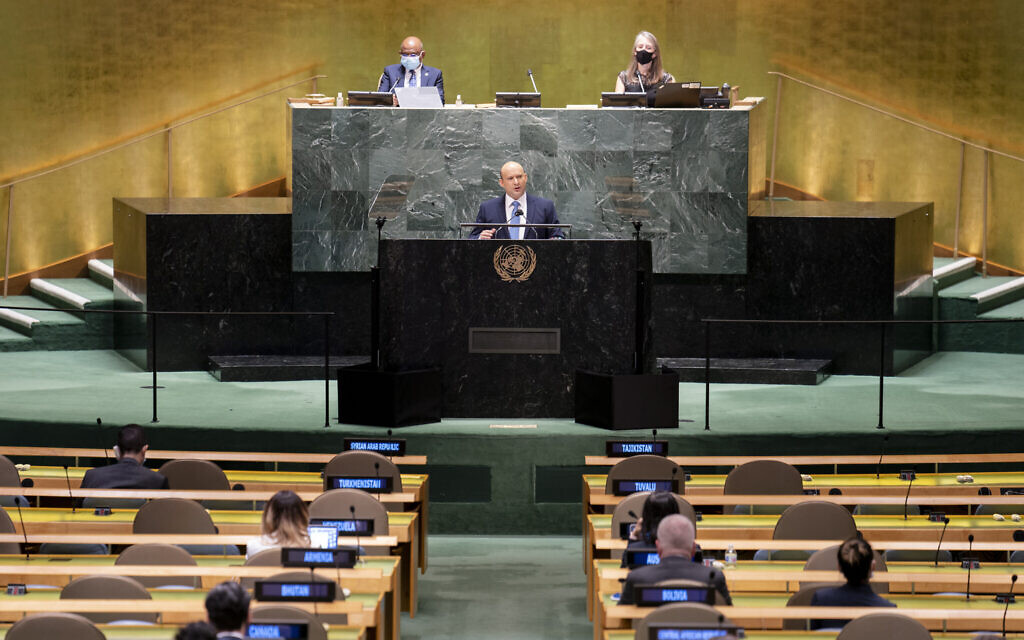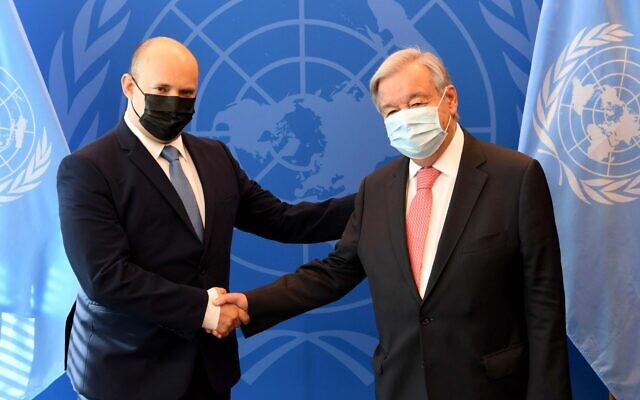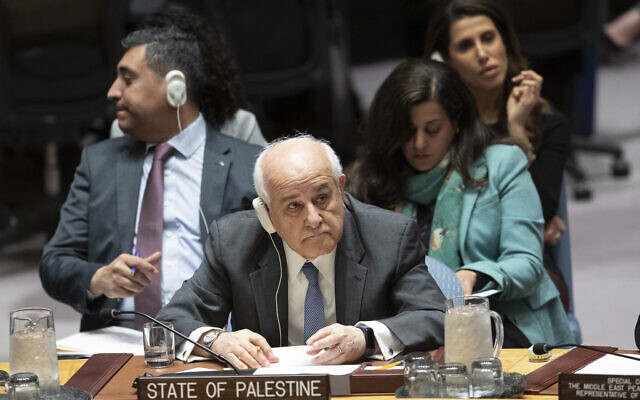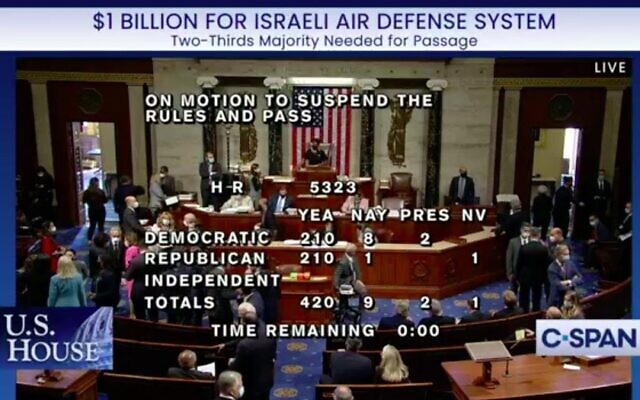PM believes Biden, friendly Arab leaders understand peace negotiations are currently not feasible and won’t press him on it, while left-wing of his coalition lacks real influence

NEW YORK — Even before Prime Minister Naftali Bennett’s Monday appearance at the United Nations, his office sought to ready the public for the premier’s intention to lightly brush over the Palestinian issue in his speech.
A diplomatic aide who briefed reporters on what to expect said the matter “would not take up much space.”
In the end, the word “Palestinian” wasn’t mentioned at all.
The closest Bennett got was his inclusion of the Palestinian terror groups Hamas and Islamic Jihad among the list of hostile forces active just beyond Israel’s borders.
Still, the premier sought to establish a counter-narrative. “For way too long, Israel was defined by wars with our neighbors. But this is not what Israel is about,” Bennett said. “Israelis don’t wake up in the morning thinking about conflict.”
The decision to pass over the issue irked the prime minister’s left-wing coalition partners, in addition to the Palestinian Authority’s ambassador to the UN, but Bennett appears to believe that those in more influential spheres will not be losing sleep over the snub.

Explaining the prime minister’s thought process, an Israeli diplomatic source clarified Monday that the premier was not trying to suggest that the Palestinians don’t exist. “In the past though, there was an obsession with this issue and it [was allowed to] define us.”
“But [US President Joe] Biden, [Egyptian President Abdel-Fattah] el-Sissi, [Jordan’s King] Abdullah and even [UN Secretary-General Antonio] Guterres recognize that this issue is not the core issue and that there will not be diplomatic negotiations,” the Israeli official said.
Indeed, the Palestinian issue was only mentioned briefly in Biden’s remarks to the UN last week, during which the US president acknowledged that “we’re a long way from [the two-state] goal at this moment.”
After meeting Bennett earlier this month, Sissi’s office issued a statement expressing his support for the two-state solution and for reviving peace talks between Israelis and Palestinians. However, an Arab diplomat familiar with the matter said the issue was not emphasized during the Sharm el-Sheikh sit-down and that reports of Cairo readying to unveil a new peace initiative were false.
For his part, Jordan’s Abdullah, during a meeting with the Conference of Presidents of Major Jewish Organizations earlier this month, “spoke in a positive light” regarding his new relationship with Bennett, who he hosted covertly at his palace in Amman in July.
Bennett sat down with Guterres after his General Assembly address and the two simply “exchanged views on regional developments, including the Middle East peace process,” according to the secretary general’s office.

There were some who did strongly and immediately voice their objections to Bennett’s decision to gloss over the Palestinians.
“We in Meretz are actually interested in [dealing with] the Palestinians. We will continue to work from within and outside the government to promote a two-state solution and resurrect ties with the Palestinian Authority. Ignoring the Palestinians means continuing with the creeping annexation and gallop toward a binational state,” the left-wing coalition party said in a statement.
But Meretz’s influence over government policy vis a vis the Palestinians is minimal, especially given the offices that it controls. Its ministers of health [Nitzan Horowitz] and environmental protection [Tamar Zandberg] have met with their Palestinian counterparts, and Regional Cooperation Minister Issawi Frej has also been in contact with PA Civil Affairs Minister Hussein al-Sheikh, but an Israeli official from another coalition party described the latter’s clout on the matter as “limited.”
It was Defense Minister Benny Gantz from the centrist Blue and White party who Bennett green-lit to meet with PA President Mahmoud Abbas last month. The same Gantz who later told Foreign Policy that Israel would not dismantle a single one of its settlements in the West Bank — a position that both Meretz and the PA view as a non-starter.
In addition to Meretz, the PA’s ambassador to the UN Riyad Mansour told the Ashams radio station that Bennett’s failure to engage with the Palestinians in his speech showed an Israeli premier who “is out of touch with the international community” that cares deeply about the issue.
But Bennett believes he can live with an embittered Ramallah.

The diplomatic official who briefed reporters on the premier’s mindset after Monday’s speech called Abbas’s address at the UN “pathetic.”
The PA president demanded that Israel withdraw to the 1967 boundaries within one year or he would withdraw the PLO’s recognition of the Jewish state and push for more war crimes charges against Israel.
The Israeli premier has already stated he has no interest in meeting with Abbas, given the latter’s efforts to have Israel charged for war crimes at the International Criminal Court.
Shrinking the Palestinians into oblivion
Some interpreted the successful effort last week by a small group of progressive Democrats to remove funding for Israel’s Iron Dome missile defense system from a government spending bill as proof that the party has shifted away from Israel. Here too, however, Bennett does not seem fazed.
In an address to leaders of Jewish federations soon after leaving the UN, Bennett focused on the overwhelming vote in favor of the Iron Dome funding that took place in the US House of Representatives two days after the so-called Squad managed to have the $1 billion scrapped from the stopgap emergency government funding bill.
“I was very happy with the great result,” Bennett said.
“I want to make a point though,” he continued, arguing that 420 to 9 vote “was not only because Iron Dome is [a] defensive [weapons system].”
Bennett maintained that US lawmakers’ support for the bill also had to do with their subscription to his own view that Israel is a “lighthouse in a stormy sea.”

“It’s not only about Iron Dome. The very essence of [Israel being] here means that the terror is at bay, to a degree,” he said. “We’re the solution, smack in the middle of the toughest region of the world… We’re fighting the problem and [maybe] not solving it, but managing it.”
Bennett’s realist approach to global terrorism appeared similar to his stance on the Palestinians. While refusing to offer political sovereignty, behind closed doors the premier and his aides have recognized the need to advance measures that improve the economy and livelihood for the millions beyond the Green Line under Israeli military control.
Some might call this “managing the conflict,” but Bennett has preferred the phrase “shrinking the conflict,” borrowing the concept from Israeli political philosopher Micha Goodman, who serves as an unofficial adviser.
Two government officials have told The Times of Israel that Bennett is allowing Gantz’s Defense Ministry to take the lead on outreach to the Palestinians and on advancing measures to strengthen the PA, recognizing that such issues don’t play well with his right-wing base, as small as it might be.
Hence, his decision to shrink the issue into oblivion on Monday.
The premier appears to believe that the people who mind don’t matter, and the people who matter don’t mind.
As reported by The Times of Israel
